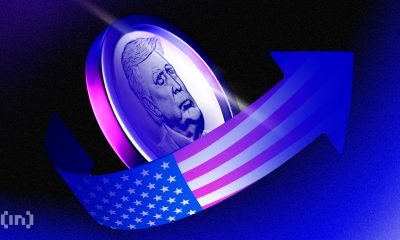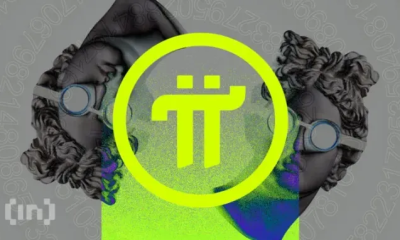Regulation
Samourai Wallet co-founder released on $1M bond after pleading not guilty


- Samourai Wallet founders have been charged with money laundering and operating an unlicensed business.
- Keonne Rodriguez, one of the co-founders, was released on a $1M bond after pleading not guilty in NYC court.
- The legal proceedings raise concerns about the future of non-custodial crypto services in the U.S.
During an appearance at the U.S. District Court for the Southern District of New York on Wednesday, Samourai Wallet co-founder Keonne Rodriguez entered a plea of not guilty to the charges brought against him and his associate William Hill and an assistant U.S. Attorneys agreed to the $1 million bond, with travel restrictions.
The lawsuit against Rodriguez and his associate William Hill alleges that Samourai Wallet facilitated over $100 million in money laundering transactions from illegal dark web markets. The two were arrested on April 24 in different jurisdictions.
Keonne Rodriguez’s bail terms
Despite being released on a $1 million bond, Rodriguez was restricted to only travel to certain areas of New York and Pennsylvania. He will be confined to his residence in Harmony, Pennsylvania, and required to wear a location monitoring device.
Additionally, Rodriguez is prohibited from engaging in any cryptocurrency transactions without prior approval from the court.
Rodriguez’s case is scheduled to proceed in the Southern District Court of New York, with Rodriguez set to appear again on May 14 with the involvement of Judge Richard M. Berman, known for presiding over high-profile cases, adding to the weight of the proceedings.
The outcome of the legal proceedings against could have far-reaching implications for the cryptocurrency industry.
William Hill, the co-accused and chief technology officer of Samourai Wallet, despite being arrested on the same day as Rodriguez has not yet been presented in a any U.S. courtroom. This could be because of Hill having been arrested in Portugal meaning authorities are possibly working through extradition proceedings.
Implications of the Samourai Wallet legal proceedings
The arrests and subsequent legal proceedings against Rodriguez and Hill have sparked debates regarding the definition of non-custodial wallets as money service businesses.
The allegations of Samourai Wallet facilitating money laundering transactions from illegal dark web markets raise questions about the broader implications for self-custodial tools in the cryptocurrency ecosystem.
As reported earlier, Self-custodial crypto wallets like Wasabi Wallet and Phoenix have gone ahead to restrict U.S. users fearing legal proceedings following the arrest and prosecution of the Samourai Wallet founders and a possible Metamask investigation.
The case challenges the interpretation of guidelines issued by the Financial Crimes Enforcement Network (FinCEN) regarding money transmission services with the Department of Justice (DOJ) arguing that the operation of Samourai Wallet’s services, including the broadcasting of transactions and collection of fees, falls within the scope of a money service business.
The indictment also raises concerns about potential efforts to KYC (Know Your Customer) the Bitcoin network, with implications for miners, node operators, and other entities involved in cryptocurrency transactions.
The FBI has already issued a public service announcement urging caution regarding cryptocurrency money service businesses that do not require KYC information.
Regulation
Japan Set To Classify Cryptocurrencies As Financial Products, Here’s All

Cryptocurrency investors in Japan are bracing for impact following a plan to reclassify digital assets as financial products. While the plan has elicited excitement from cryptocurrency enthusiasts in the Far East, the ambitious plan will have to scale several legislative hurdles.
Japan Targets Reclassification Of Cryptocurrencies As Financial Products
According to a report by Nikkei, Japan’s Financial Services Agency (FSA) is inching toward classifying cryptocurrencies as financial products. Per the report, the FSA intends to achieve the reclassification via an amendment to the Financial Instruments and Exchange Act.
Currently, digital assets in Japan are considered crypto assets conferred with property rights and seen as payment means. Under the FSA’s plans, cryptocurrencies in Japan will be treated as financial products in the same manner as traditional financial products.
The FSA says it will adopt a slow and steady approach toward the reclassification, carrying out “a private expert study group” to test the waters. If everything goes according to plan, the FSA will submit the amended bill to Parliament in early 2026.
The classification of cryptocurrencies as financial products will have far-reaching consequences for the local ecosystem. Experts say treating cryptocurrencies as financial products will bring Japan closer to a crypto ETF launch amid a changing regulatory landscape.
Furthermore, the move may lower current cryptocurrency taxation for local investors since existing capital market rules will apply to the asset class.
A Fresh Bill For Crypto Insider Trading Is Underway
Apart from the reclassification, the FSA disclosed plans for new legislation against insider trading. The move flows treating cryptocurrencies as financial products and will strengthen existing investor protection rules.
“It is a direction to establish a new insider trading regulation that prohibits trading based on unpublished internal information,” said the FSA. “We will develop laws to prevent unfair transactions.”
However, Japan’s cryptocurrency scene is heating up to a boil, driven by local and international players. Last week, stablecoin issuer Circle secured approval from the FSA for USDC with top exchanges set to list the stablecoin.
Japan’s Metaplanet has tapped Eric Trump to join its Strategic Board of Advisors as it continues to load up Bitcoin.
Disclaimer: The presented content may include the personal opinion of the author and is subject to market condition. Do your market research before investing in cryptocurrencies. The author or the publication does not hold any responsibility for your personal financial loss.
Regulation
Kentucky Governor Signs Off On ‘Bitcoin Rights’ Bill, Strengthening Crypto Protections


In what is being dubbed a major development in the crypto regulation space, the Governor of the US state of Kentucky, Andy Beshear, has signed the ‘Bitcoin Rights’ bill into law. The law promises to safeguard protections for Bitcoin (BTC) users.
Bitcoin Rights Bill Comes Into Effect
Crypto regulations continue to evolve under pro-crypto US President Donald Trump’s administration. In the latest development, Kentucky has become the newest state to enshrine protections for digital asset users.
In an X post published on March 24, crypto advocacy group Satoshi Action Fund announced that Governor Beshear had signed the much-anticipated Bitcoin Rights bill into law. The post stated:
The right to self-custody, run a node, and use of digital assets is now protected for millions of Americans without fear of discrimination.
The bill was first introduced to the Kentucky House by Rep. Adam Bowling on February 19. According to the bill’s description, it seeks to safeguard users’ rights to use digital assets and self-custody wallets. Additionally, it aims to prohibit local zoning changes that discriminate against crypto mining operations.
The legislation outlines guidelines for running a digital asset node and excludes digital asset mining from money transmitter license requirements. It also clarifies that crypto mining or staking is not considered an offer or sale of securities.
On February 28, the bill passed Kentucky’s House of Representatives with a unanimous vote of all 91 representatives in favor. It later passed the Kentucky Senate on March 13, receiving backing from all 37 senators.
Kentucky’s proactive stance toward cryptocurrencies isn’t new. Earlier this year, the state became the 16th US state to introduce legislation seeking to create a Bitcoin strategic reserve.
Meanwhile, neighboring state Arizona is also joining the crypto movement. A recent X post by Bitcoin Laws revealed that Arizona’s House Rules Committee has passed two Bitcoin reserve bills — SB1373 and SB1025. These bills will now head to a full floor vote.
Renewed Optimism Under Trump Administration
Following Trump’s victory in the November presidential election, cryptocurrency regulations in the US are evolving rapidly, with many states introducing legislation aimed at strengthening their digital asset ecosystems and attracting crypto businesses.
Positive changes in crypto regulations are encouraging industry businesses to expand. For instance, leading crypto trading platform Coinbase recently announced plans to hire 1,000 employees in the US.
The Trump administration has also witnessed several lawsuits being dropped against major crypto entities, including Kraken, Coinbase, Gemini, and others. At press time, Bitcoin trades at $87,399, down 0.2% in the past 24 hours.

Featured Image from Unsplash.com, chart from TradingView.com

Editorial Process for bitcoinist is centered on delivering thoroughly researched, accurate, and unbiased content. We uphold strict sourcing standards, and each page undergoes diligent review by our team of top technology experts and seasoned editors. This process ensures the integrity, relevance, and value of our content for our readers.
Regulation
US SEC Drops Charges Against Hawk Tuah Girl Hailey Welch

Hawk Tuah girl Hailey Welch, known for her association with the controversial $HAWK token, has been cleared of any wrongdoing after a lengthy investigation by the U.S. Securities and Exchange Commission (SEC). The SEC has decided not to press charges against Welch in connection with the rapid rise and subsequent collapse of the meme-based cryptocurrency.
US SEC Investigation Into Hawk Tuah Girl Concludes Without Charges
The SEC had launched an investigation into the $HAWK token after its dramatic price drop. The token, which was linked to Welch’s viral persona, initially saw a market cap surge to $490 million before crashing by over 90%. Investors who were impacted by the crash filed a lawsuit against those behind the project, alleging that the coin had been promoted and sold without proper registration.
Hawk Tuah girl Hailey Welch, who cooperated fully with the investigation, expressed relief after the SEC’s decision. “For the past few months, I’ve been cooperating with all the authorities and attorneys, and finally, that work is complete,” Welch told TMZ.
Her attorney, James Sallah, confirmed that the SEC had closed the case without any findings against her, adding that there would be no monetary sanctions or restrictions on Welch’s future involvement in cryptocurrency or securities.
This Is A Developing News, Please Check Back For More
Disclaimer: The presented content may include the personal opinion of the author and is subject to market condition. Do your market research before investing in cryptocurrencies. The author or the publication does not hold any responsibility for your personal financial loss.
-

 Ethereum24 hours ago
Ethereum24 hours agoWhales Accumulate 470,000 Ethereum In One Week – Bullish Momentum Ahead?
-

 Regulation21 hours ago
Regulation21 hours agoJapan Set To Classify Cryptocurrencies As Financial Products, Here’s All
-

 Market23 hours ago
Market23 hours ago3 Token Unlocks for April: Parcl, deBridge, Scroll
-

 Market20 hours ago
Market20 hours agoTop 3 Made in USA Coins to Watch This Week
-

 Market19 hours ago
Market19 hours agoSolana (SOL) Price Risks Dip Below $110 as Bears Gain Control























✓ Share: